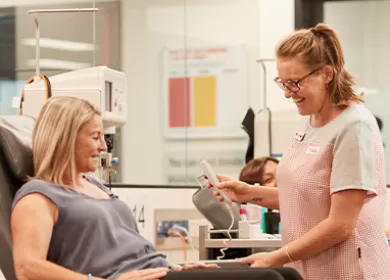
At times, your blood pressure can drop or your heart rate can slow down suddenly, and sometimes your body reacts to that. You might feel faint, nauseous, or light-headed or, in some cases, lose consciousness.
Our team are there to help you out, so let them know straight away if you feel dizzy or unwell. You’ll be able to sit or lie down as long as you need to, and have something to eat or drink. When you feel better you can carry on with your day, but don’t drive for at least 12 hours.
Remember: it’s unlikely to happen to you. It happens to less than 3% of donors.

Sometimes, it can happen for seemingly no reason at all. These things can make a reaction more likely:
- Feeling anxious about needles, pain or the sight of blood
- Standing for long periods after donating
- Standing too quickly after donating
- Some blood pressure-lowering medications
- Hot or warm environments
- Needing a longer time to donate or having flow issues
- Reacting to the citrate during a plasma donation
Can I still donate after feeling faint?
Yes, unless someone from Lifeblood tells you otherwise. We’d love to see you again! Most donors who come back have a great next donation. See the tips below to help you prepare.
Tips for your next donation
If fainting is on your mind, check out these tips for how to feel great when you donate.
Before you donate

The best experiences are shared! Bring a friend or family member to donate with you to help you stay relaxed and pass the time quickly.

Give yourself plenty of time for your next donation, both before and after. When you donate, you give up to 15 per cent of your blood volume – so your body might need some time to adjust.
We know you’re busy, but try not to rush around or do strenuous exercise before and after your donation. Make sure you stay hydrated and have plenty to eat. Give yourself a well-deserved break!

Check out tips for how much water to drink the day before you donate, and the day you donate.
After registering at reception, drink two glasses of water while you wait to go into your interview. Not only should you stay hydrated throughout the day, but these extra two glasses help to increase your blood pressure by stretching your stomach wall.
During your donation
When you’re giving plasma, a liquid called citrate anticoagulant is added to stop your blood from clotting while the machine separates your red cells from your plasma.
When your red blood cells are being returned, they carry with them a tiny amount of citrate. This is not harmful, but it can cause a drop in your calcium levels. Some people experience a metallic taste or numbness and tingling sensations in their lips, and it can also cause you to feel faint.
Taking a few calcium tablets, like QUICK-EZE, can help maintain your calcium levels and reduce your chance of feeling faint. We'll have some calcium tablets ready the next time you come in for your plasma donation.
One of the best (and easiest) ways to stay well during and after your donation is to do muscle tensing exercises. They’ll increase your blood pressure almost immediately, which will help you avoid feeling faint.
Do these exercises before the needle goes in or comes out, and before getting up from the donation chair.
- Cross your legs
- Squeeze your inner thigh and abdominal muscles
- Stretch your ankles
- Hold for 5 seconds, then relax for 5 seconds. Repeat 5 times then switch legs.
Ask our staff at your next donation on how to do these exercises if you'd like advice.
Our staff are there to help. If you have any concerns or would just like to have a chat, please speak up! And be sure to let us know what happened last time. The team can keep an eye on you, give you some advice and just make sure everything’s OK.
After you donate
After finishing your donation, take some time to relax in the donation chair to let your body adjust to the volume loss. It is best to stay for an extra 5 minutes in the chair to make sure you are feeling okay before slowly getting up.
Moving too quickly from a reclined position to an upright position can cause you to feel faint or dizzy.
Overheating or standing up for long periods lowers your blood pressure and increases your risk of feeling faint. So, for about 8 hours after you donate, avoid hot showers, strenuous exercises or walking for long periods. Keep drinking plenty of cool fluids, and avoid alcoholic drinks for those 8 hours.
After you donate, don't forget to celebrate what you've achieved. It's an amazing thing to give life. We look forward to seeing you soon.
You may also like

Can I donate?
We ask lots of questions to find out if it's safe for you to make a donation, and if there is any risk of infection that could be passed on.
Check your eligibility
Prepare and aftercare
Take a look at this handy guide to know what to expect – whether it's your first time, or you're a veteran life-saver.
Browse your donation guide
Tips to relax when donating
Check out these top tips from our most experienced donors and nurses.
Read our tips to relax
